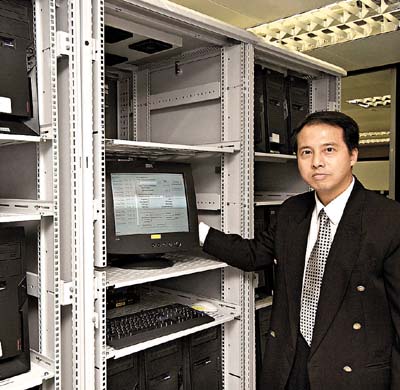High-powered system to crack password-protected files
The Commercial Crime Bureau's Technology Crime Division (TCD) has, in co-operation with the Hong Kong University of Science and Technology, developed a high-powered system to crack password-protected files.
The system, known as "Password Cracking Cluster", consists of 25 high-powered computers.
Acting Chief Inspector Collins Leung, who is responsible for the project, said: "This password cracking cluster is a high-powered computation system. The speed of its operation is 30 to 50 times faster than any single computer. It might take about 3,000 days to crack a password with eight characters in length with an ordinary computer, but the new system using a clustering technology can reduce the time to two or three days.

Senior Superintendent Kenneth Li introduces the functions of the "Password Cracking Cluster"
The software has been specially designed to run on this cluster for its durability and prolonged operational need.
"After testing lasting for months, its performance was found very satisfactory. Moreover, considerations of its extensibility and future development have been included even in the design stage.
"To further increase its computation power, what we need to do is to add more computers into the cluster."
Meanwhile, Senior Superintendent Kenneth Li in charge of TCD pointed out that the Force had already built up its capability in tackling technology crimes and the result was "obvious". "As technology crimes know no boundary, we've offered assistance to other law enforcement agencies in cracking the crimes," Mr Li added.
Mr Li reiterated that it was important to obtain support from senior management in terms of resources as well as leadership. As such, a "Technology Crime Steering Committee', chaired by Director of Crime and Security, meets regularly to make and review long-term objectives and strategies in combating technology crimes.
"The purpose of this is to provide a secure online environment in Hong Kong in order to facilitate the development of e-business," he noted.
The Force first established the Computer Crime Section (CCS) in 1993 to develop its professional capability in combating technology crimes. CCS was further expanded in 2001 to form the TCD.
 The Force has developed a high-powered system to combat technology crimes
The Force has developed a high-powered system to combat technology crimes